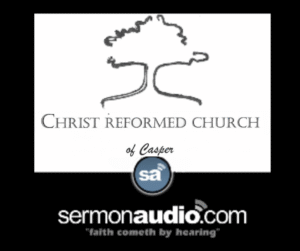LORD’S DAY 8
24. How are these articles divided?
Into three parts: the first is of God the Father and our creation; the second, of God the Son and our redemption; the third, of God the Holy Spirit and our sanctification.1
[1] 1 Pet. 1:2; *1 Jn. 5:7.
25. Since there is but one Divine Being,1 why do you speak of three persons: Father, Son, and Holy Spirit?
Because God has so revealed Himself in His Word,2 that these three distinct persons are the one, true, eternal God.
[1] Deut. 6:4. [2] Isa. 61:1; Ps. 110:1; Matt. 3:16–17; 28:19; 1 Jn. 5:7; *2 Cor. 13:14.
Trinitarian Salvation
God is a Trinity, which is not at all the same thing as saying there are three Gods, or that there is one God who sometimes acts in different ways. It is saying that there is one God revealed to us in the Scriptures, perfectly united in will, in essence, and intention, but that there are three persons, three centers of consciousness that share this one essence. Everything God does He does as a Trinity, meaning that the three persons of the Trinity cooperate to do together whatever God does. But the distinction remains, among other reasons, because these three Persons are each involved in different aspects of the process.
This matters because if we want to understand anything that God does, we must understand Him acting as a Trinity. Now nobody comprehends the Trinity fully, because God is beyond our comprehension. But we can grasp what God reveals about Himself, and we need to grasp it, or we will fail to understand what God has revealed about His works. It is easy to become imbalanced in our thinking about our salvation, and focusing too much on the work of one Person of the Trinity or neglecting the work of another Person will inevitably lead to these kinds of imbalances. Arminianism, hyper-calvinism, sacerdotalism, Pentecostalism, the social gospel and many other errors can all be understood to some degree as focusing too much on just one person of the Trinity (Son, Father, Son, Spirit, Father, respectively) and therefore just one aspect of our salvation, and neglecting the work of the whole.
The Father is the ruler, the ordainer, the decider. He dictates what will be. He is the creator of all things and upholds and orders all things by His will. He sent the Son to Earth with His mission of salvation. Jesus frequently emphasizes that everything He does and says are the will of His Father. The Father decrees who will be saved and the way that they will be saved.
The Son is the Word of God, the communication of God’s decree. He communicates the power of the Godhead to creation. He achieves what God wishes to achieve. In creation it was the Word of God which was the instrument by which God called into existence everything that was and is; and in our salvation it is Jesus who came to earth and achieved the victory over sin and death and the redemption of those the Father elected to salvation. He died for the sins of His people, freeing them from misery and slavery, the consequence of sin, and He lived the perfect life of a faithful servant, fulfilling the demands of God’s law on our behalf and earning us a place in the favor of God.
The Spirit is the Power of God, the executor of the Trinity. It is the Spirit who works in the life and heart of the believer to achieve what He wishes to achieve. He works faith in the elect of God so that they can understand and lay hold of Christ’s work of salvation. He then communicates the power of Christ’s salvation to us through the means which He has appointed (Word, Sacrament and prayer), to form Christ within us, to teach us repentance from sin, to turn us to God’s law to reform our character, to make us what God intends for us to be. As the Spirit is an equal partner in the Trinity, so His work is indispensable. Without the work of the Spirit applying the salvation of Christ in our hearts, the death of Jesus on the cross serves no purpose and the intention of God in salvation, to call a holy people to Himself, would go unfulfilled.
Though the Three are equal in terms of their being and essence, yet in terms of their operations there is order within the Trinity. The Father sends the Son, and the Father and Son together send the Spirit. The designation of the three persons as first, second and third is not arbitrary; it is the order in which they act. But in terms of our subjective experience of salvation, the order is reversed. First we experience the work of the Spirit in our lives, teaching us repentance and faith. That work of the Spirit unites us to Christ and to His life, which is then formed in us by that power. Paul says, “Nevertheless it is not I who live, but Christ who lives in me.” We are united to Christ through the Spirit, and that is the link that drives our salvation. The ultimate purpose of being united to Christ is to be reunited to the Father. He came to show us the Father, to bring us to the Father so that we will dwell in fellowship with the Father for all eternity.
Understanding what the Scriptures tell us about the Trinity and the role each plays in our salvation is a wonderful way to maintain balance in our understanding of salvation, to give proper weight to all its different aspects. It also fulfills the very purpose of our existence, which is to know God and glorify Him in perfect fellowship.
“…elect according to the foreknowledge of God the Father, in sanctification of the Spirit, for obedience and sprinkling of the blood of Jesus Christ: Grace to you and peace be multiplied. (1Pe 1:2 NKJ)”


Comments are closed, but trackbacks and pingbacks are open.